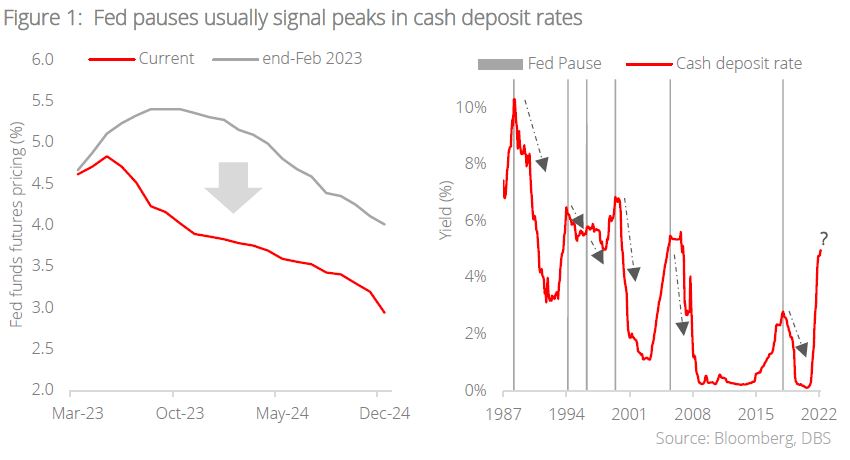- Recent bank failures highlight the risks of traditionally “safe” cash deposits
- Should a Fed pause be on the cards, it usually does not bode well for high cash yields in future
- Credit usually outperforms cash at the end of the policy hiking cycle
- Capitalise on this narrowing window of high rates by shifting cash towards high quality credit

Whose deposits are they anyway? In light of recent bank failures and stresses, the previously undisputed notion that cash deposits are always and everywhere “safe” has been called into question. Under normal circumstances, those with money in the bank do not often consider that, outside the insured limits in their various jurisdictions (e.g., the Federal Deposit Insurance Corporation insures up to USD250k per depositor in the US), one turns from a depositor to a senior unsecured creditor of the bank. Clearly, being a senior unsecured creditor is of material concern when the solvency of the debtor is in doubt – as was the case with the recent failures of Silicon Valley bank and Signature bank in the US.
Bad news comes in pairs – high returns of cash is now at risk. Not only have concentration risks of cash deposits been made apparent, but so have return risks. Banking sector-related stresses have resurfaced narratives of monetary policy tightening having run its course, resulting in a massive 1.5% decline in the December Fed funds futures pricing since end-Feb 2023. Should this signal a pause in/the end of the Fed hike cycle, the days of high yields on cash deposits are certainly numbered, if history is any guide.
Cash or credit? This was the premise for our long-standing preference for quality credit over cash deposits, given that investors (a) can be well-diversified rather than have financial sector concentration risks, and (b) can lock in higher yields for a longer duration than the fleeting high rates of cash. The past 20 years illustrates this clearly; cash yields hardly ever come close to IG credit for more than a year. This means that investors are often better off taking a bit of duration risk in IG credit to lock in such high yields for a longer timeframe.
Moreover, high cash rates are not sustainable in a highly leveraged world; when cash and IG yields coincide, a recession generally ensues which forces rates lower again. Investors who hold only cash would merely see reinvestment risks with the decline in rates, while IG credit investors would experience capital gains as the rate environment adjusts lower, lifting bond prices.
Download the PDF to read the full report.
Topic
This information herein is published by DBS Bank Ltd. (“DBS Bank”) and is for information only. This publication is intended for DBS Bank and its subsidiaries or affiliates (collectively “DBS”) and clients to whom it has been delivered and may not be reproduced, transmitted or communicated to any other person without the prior written permission of DBS Bank.
This publication is not and does not constitute or form part of any offer, recommendation, invitation or solicitation to you to subscribe to or to enter into any transaction as described, nor is it calculated to invite or permit the making of offers to the public to subscribe to or enter into any transaction for cash or other consideration and should not be viewed as such.
The information herein may be incomplete or condensed and it may not include a number of terms and provisions nor does it identify or define all or any of the risks associated to any actual transaction. Any terms, conditions and opinions contained herein may have been obtained from various sources and neither DBS nor any of their respective directors or employees (collectively the “DBS Group”) make any warranty, expressed or implied, as to its accuracy or completeness and thus assume no responsibility of it. The information herein may be subject to further revision, verification and updating and DBS Group undertakes no responsibility thereof.
All figures and amounts stated are for illustration purposes only and shall not bind DBS Group. This publication does not have regard to the specific investment objectives, financial situation or particular needs of any specific person. Before entering into any transaction to purchase any product mentioned in this publication, you should take steps to ensure that you understand the transaction and has made an independent assessment of the appropriateness of the transaction in light of your own objectives and circumstances. In particular, you should read all the relevant documentation pertaining to the product and may wish to seek advice from a financial or other professional adviser or make such independent investigations as you consider necessary or appropriate for such purposes. If you choose not to do so, you should consider carefully whether any product mentioned in this publication is suitable for you. DBS Group does not act as an adviser and assumes no fiduciary responsibility or liability for any consequences, financial or otherwise, arising from any arrangement or entrance into any transaction in reliance on the information contained herein. In order to build your own independent analysis of any transaction and its consequences, you should consult your own independent financial, accounting, tax, legal or other competent professional advisors as you deem appropriate to ensure that any assessment you make is suitable for you in light of your own financial, accounting, tax, and legal constraints and objectives without relying in any way on DBS Group or any position which DBS Group might have expressed in this document or orally to you in the discussion.
Any information relating to past performance, or any future forecast based on past performance or other assumptions, is not necessarily a reliable indicator of future results.
If this publication has been distributed by electronic transmission, such as e-mail, then such transmission cannot be guaranteed to be secure or error-free as information could be intercepted, corrupted, lost, destroyed, arrive late or incomplete, or contain viruses. The sender therefore does not accept liability for any errors or omissions in the contents of the Information, which may arise as a result of electronic transmission. If verification is required, please request for a hard-copy version.
This publication is not directed to, or intended for distribution to or use by, any person or entity who is a citizen or resident of or located in any locality, state, country or other jurisdiction where such distribution, publication, availability or use would be contrary to law or regulation.
If you have received this communication by email, please do not distribute or copy this email. If you believe that you have received this e-mail in error, please inform the sender or contact us immediately. DBS Group reserves the right to monitor and record electronic and telephone communications made by or to its personnel for regulatory or operational purposes. The security, accuracy and timeliness of electronic communications cannot be assured.

